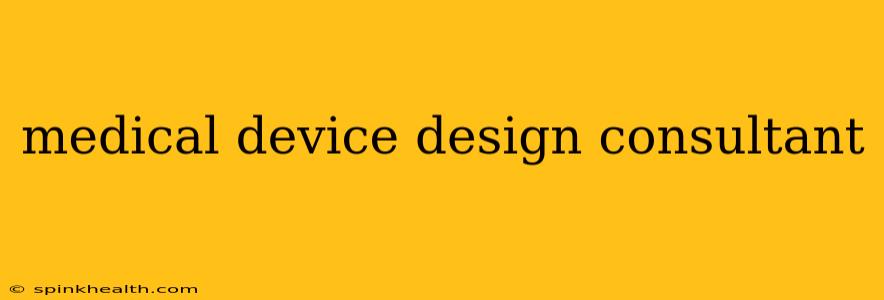The world of medical devices is a fascinating blend of cutting-edge technology and unwavering commitment to human health. Creating these life-altering tools requires meticulous planning, rigorous testing, and an unwavering focus on safety and efficacy. That's where medical device design consultants come in – the unsung heroes behind many innovations that improve and save lives. This journey will take you through the crucial role of a medical device design consultant, exploring their expertise and the complexities they navigate daily.
Imagine a bustling hub of innovation, where engineers, designers, and clinicians collaborate. That's the reality for a medical device design consultant. They are the bridge between brilliant ideas and market-ready products, guiding medical device companies through the labyrinthine regulatory landscape and the ever-evolving technological advancements.
What Does a Medical Device Design Consultant Do?
Medical device design consultants aren't just problem-solvers; they are strategic partners. Their role encompasses a vast spectrum of activities, from the initial concept development to post-market surveillance. This includes:
- Conceptualization and Ideation: They work closely with clients to translate clinical needs into functional designs, considering factors like usability, ergonomics, and manufacturability.
- Design and Development: This phase involves the creation of detailed designs, prototyping, and rigorous testing to ensure the device meets all safety and performance standards.
- Regulatory Compliance: Navigating the complex maze of FDA regulations (and international equivalents) is a core competency. They ensure that the device complies with all relevant standards, minimizing delays and potential setbacks.
- Manufacturing and Production: They offer guidance on selecting appropriate manufacturing processes, materials, and suppliers, ensuring cost-effectiveness and quality control.
- Post-Market Surveillance: Even after a device is launched, the consultant's work continues. They help monitor its performance, address any issues that arise, and ensure ongoing compliance.
What Qualifications Do Medical Device Design Consultants Need?
The path to becoming a successful medical device design consultant requires a unique blend of expertise. A strong background in engineering (biomedical, mechanical, electrical) is often essential, coupled with a deep understanding of regulatory requirements (like FDA 510(k) submissions and ISO 13485). Moreover, experience in design control processes, risk management, and human factors engineering is invaluable. Strong communication and project management skills are crucial for effective collaboration with diverse teams.
How Much Does a Medical Device Design Consultant Cost?
The cost of engaging a medical device design consultant varies widely depending on several factors. These include the complexity of the project, the consultant's experience and expertise, the duration of the engagement, and the geographic location. It's crucial to obtain detailed proposals from multiple consultants to compare pricing structures and services offered.
What are the Different Types of Medical Device Design Consultants?
The field encompasses diverse specializations. Some consultants might focus solely on regulatory affairs, while others specialize in specific device types (e.g., implantable devices, diagnostic tools). Some possess expertise in specific design methodologies (e.g., human factors engineering, design thinking). Understanding the various niches allows companies to select the most appropriate consultant for their unique needs.
What are the Benefits of Hiring a Medical Device Design Consultant?
The advantages are numerous:
- Expertise and Experience: Consultants bring a wealth of knowledge and experience to the table, often having worked on numerous successful medical device projects.
- Reduced Risk: Their expertise minimizes the risk of design flaws, regulatory hurdles, and costly delays.
- Faster Time to Market: Their efficiency can significantly speed up the product development process.
- Cost Savings: While there's an initial investment, the long-term cost savings often outweigh the fees.
- Access to Specialized Knowledge: They offer access to specialized knowledge and skills that may not be readily available within a company.
The world of medical device design consulting is dynamic and ever-evolving. As technology advances and regulations adapt, the role of these professionals will only become more critical in shaping the future of healthcare. Their dedication ensures that innovative medical devices reach patients safely and effectively, ultimately improving lives around the globe.

